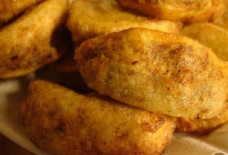The Staples of a Moroccan Kitchen
By: Nouha Elyazidi / Arab America Contributing Writer
Traditional Moroccan cuisine is globally recognized for its unparalleled flavor and taste. Moroccan cuisine can often be intricate and detailed with its spices and presentation. Before you learn how to make sweet and savory chicken Bastilla or mouthwatering chicken tagines, it is important to learn about the essentials of Moroccan cooking. The reason these items are so essential and popular in Moroccan cooking is that they are typically resources naturally found in Morocco because Moroccan cooking is heavily influenced by the natural resources of the land.
Olive Oil
The base for almost all Moroccan cooking is olive oil. Olive oil in Morocco is used in making simple things such as making an omelet or sauteing veggies, and can be used in complicated things such as tagines! Olive oil is a natural stunning resource in Morocco. It is so good it can even be eaten for breakfast! Many will add honey to olive oil and use it as a dipping bread for breakfast. Olive oil is so significant because it is used in a plethora of goods.
Couscous
The national dish of Morocco is couscous. Couscous is a dish prepared using a base of the couscous grain, a grain made from semolina, or ground durum wheat. This grain is a staple because of the cultural significance the dish couscous holds in Moroccan culture. Couscous is the pride of Morocco and is served once a week in Moroccan homes and brings the entire family together.
Harissa
Harrisa is a spicy chili paste very common in North African kitchens. Harissa is mainly used according to preferences of spice level in various dishes such as tajines, but it is a common thing found in many different dishes. Harisa has a unique fresh spicy flavor and is a large export from Morocco.
Spices
Morocco is a large producer and exporter of various spices. This becomes evident in one trip to a Moroccan souk, where there are rows of colorful aromatic spices that fill the air. These include cayenne, cinnamon, turmeric, saffron, ginger, etc. Spices are used in almost everything prepared in a Moroccan kitchen.
Almonds
Morocco is the firth ranking producer of almonds in the world. Almonds are mainly used as the base of Moroccan desserts. Almonds are often turned into a paste and used in cookies and pastries.
Smen
Smen is a preserved Moroccan butter that is used in the preparation of many Moroccan dinner dishes and mainly in Moroccan bread. It has a stronger taste and smell compared to regular butter.
Honey
Honey does not only have a significant role in Moroccan economy and cuisine, it is also recognized in the Quran for its health benefits. In Morocco honey can be mixed in with the famous Moroccan mint tea, used for pastries, and even eaten with any Moroccan bread in the mornings.
Check out our blog here!








